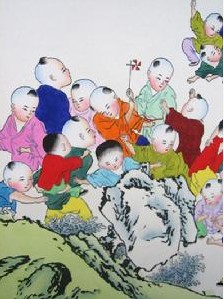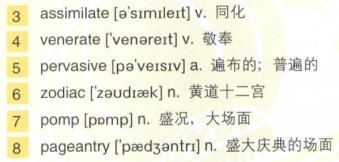英式发音 适合背诵
 你是否知道除了包饺子、封红包、探亲访友,中国传统里还有许多我们忽视的习俗?也许你并不需要遵循这些规矩,但了解这些可以让你明白过年时见到的种种表面现象。
你是否知道除了包饺子、封红包、探亲访友,中国传统里还有许多我们忽视的习俗?也许你并不需要遵循这些规矩,但了解这些可以让你明白过年时见到的种种表面现象。
The holidays in any part of the world are a time of happiness, reflection and sharing. It is especially true during the Chinese Lunar New Year, which emphasizes time with family above all else. This holiday’s unique customs have persisted for centuries and generations because they’re deeply 1)imbedded in the essence of Chinese culture.
世界上任何地方的假日节庆都是一片喜气洋洋,这是让人反思、分享的时光。中国人过农历新年更是热闹非凡。阖家团聚更是过年的重中之重。这种独特的过年习俗已经世代流传了几千年,成为根深蒂固的中国文化。
Roots归根
It is a time of much anticipated homecoming. The Chinese 2)diasporas come home. It’s a yearly migration they faithfully try to make to celebrate the most important holiday in the Chinese calendar:Lunar New Year. This journey home is also a return to spiritual roots; a time of year set aside to pay respects to the ancestors and to thank the gods that watch over them. Many Chinese believe it is the gods who grant good fortune and opportunities. Whether it’s in a clan temple, a simple shrine at home or even a ceremony on the street, the atmosphere of worship is everywhere.
这是热切盼望亲人回家团圆的时候。旅居海外的华人都会回家,他们信守这一年一度的迁徙,回家欢度这个中国历法里最重要的节日:农历新年。返乡之旅尊崇的是一种归根的观念——在年终岁末,祭拜祖先,感谢上苍的眷顾。许多中国人相信福禄乃是上苍所赐。不论是祠堂庙宇、简单的家庭神龛,或者是街上的庆典,祭祀的气氛到处弥漫。
Worship祭祀
In the past, children prepared for the holidays by writing New Year couplets for good luck while adults performed the important duty of sending off the household gods. The Chinese believe that the gods, in particular the kitchen god, leave their homes and visit the Jade Emperor, the ruler of the heavens, to report on the conduct of families. On the day of the kitchen god’s departure, the residents of the house send him off with appropriate ceremony, hoping in turn for a good report for the year.
The celebrations are not just a time of sharing gifts and meals. The elders pass on stories and legends of old including those about the origins of the Lunar New Year. It is said, many ages ago there was a great beast, known as the Nian. This beast terrified the people of China, eating as many people as he saw fit. One day, an old man went to the beast and asked him, “Why are you eating people, who are unworthy, when there are bigger creatures in the land?” The Nian saw the wisdom in this, and the old man, who was actually a god in disguise, took the beast away. He rode off on its back and told the people that to make sure the beast stayed away, they should use red, a colour the Nian hated, and make much noise, and so, for thousands of years since then, the Chinese have done just that.
从前,为了过年讨吉利要写春联,小孩会准备笔墨纸砚;大人则要给家中各路神仙送行。中国人相信诸神,尤其是灶神,他在年末返回天庭朝见玉皇大帝的时候,会禀报每户人家的行为善恶。灶神启程返回天庭的那天,家家户户都祭拜送行,希望换得灶神向玉帝说些好话。
过年的活动不限于互相送礼,大吃大喝,还会有长辈讲述古老的传说与故事,其中当然有新年的由来。据说很久以前,有一头叫“年”的巨兽,它在中国肆虐,随心所欲地吃了好多人。有一天,有个老人去见年兽,问道:“你怎么不去吃那些更大的动物?吃人真是划不来。”年兽觉得很有道理。原来老人是神仙下凡,他带走了年兽。临走前,他骑在年兽背上交代大家:为了避免年兽再次骚扰,过年时要用它讨厌的红色,还要喧闹不已,于是,数千年来,中国人都遵照这嘱咐过年。
Prayers祈祷
The celebration of the Jade Emperor’s heavenly birthday has always signaled the winding-down of New Year festivity. As it has for centuries, the ceremony begins at midnight. The shrine is decorated with paper lanterns and sugar cane, a symbol of growth and transformation. Offerings of food and flowers are made to honour the Emperor for his watchfulness over his devotees. The Jade Emperor may have his roots in Taoism, but over time he’s been 3)assimilated into Buddhist worship and is now 4)venerated by both faiths.
The Jade Emperor’s presence in Chinese culture is 5)pervasive. He figures in folklore and even the Chinese 6)zodiac. Many believe it’s also the best time for their prayers to be heard. Some ask for good health, others for profit, while still others for children.
Behind all the 7)pomp and 8)pageantry of the Lunar New Year celebrations today are values and traditions that have remained unchanged for centuries. Amidst the exploding crackers and lavish celebrations lies the core of what Lunar New Year means—a special time to renew the bonds of family.
庆贺玉帝诞辰的活动象征着过年的庆典接近尾声。数百年来,这个仪式都从午夜开始,寺庙里挂满纸糊的灯笼和甘蔗象征着兴旺和更新,人们供奉食物和鲜花,感谢玉皇大帝保佑善男信女。玉皇大帝虽然是道教的产物,却常常受到佛教徒的崇拜,现在更是释道不分了。
中国文化充斥着玉帝的身影。他存在于民间传说里,甚至中国的十二天宫都少不了他。许多人相信这是自己的诉求上达天庭的最佳时候。有人求健康,有人求财,还有人祈求生儿育女。
在当今新年盛大华丽的春节庆典背后的是几千年不变的价值观和传统。震耳欲聋的爆竹声和极尽铺张的各种活动都传递着过年的核心价值:这是增强家庭凝聚力的特别时光。
翻译:丁一


